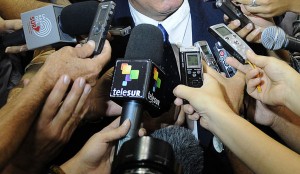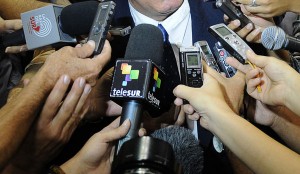¿Vocero o voz-cero?
Fernando Ravsberg (BBC)

Press conference (Photo: Raquel Perez)
“I’m not very interested in numbers,” is an acceptable phrase in the mouth of a poet or a painter but when spoken by an official linked to foreign trade in the middle of a press conference, the matter becomes worrisome.
But the Cuban political not only refuses to talk about numbers, does not mention the names of the countries to which Cuba exports services and recommend us to find the information on the news on TV and in the Office of Statistics.
It tells us that “in 2010 improved over 2009, but in speaking of improvements we want to improve more and more and more because sometimes the values are best but you have to grow in value and quantity because the numbers get better values.”
On relations with Japan states that “the sale is bought and when I say that sales are buying is of the two, you need to buy and sell you have to adapt to these consumers, but the seller is responsible for the buyer “.
Before the questions we had read a lot of pages with the names of Cuban export products, mainly pharmaceuticals, but it did keep the secret report on how much money or where they are sold.
He ended his presentation with an elaborate metaphor: “I see Cuba as a hive where the bees, industrious, healthy, working with his beekeeper”, making a subtle reference to the people and the president, Gen. Raul Castro.
I, who had just returned from vacation and went to my first press conference, I felt at home. It is the reality we live on the island journalists and official sources are those which are then complain that they do not write about “the good things in Cuba.”
That conference was a real shame because there were lots of interesting information that could have been released on the sale of Cuban services on 5 continents, has already become the main source of income for the island.
But our editors simply not enough “so good and go better.” It may be true but it is impossible to publish information without data, based only on “faith” that can awaken the words of a politician.
It is not crucify this man because he is no exception, even I would say that even with its limitations was able to sit in front of us while others keep us from claiming surprise urgent travel or illness.
Also a good government official does not have to be a good communicator, but there are. But the truth is that Cuba today is dramatically sterile advantage when the space you have to make their voices heard in the world.
Of course in the other countries the politicians play with the advantage of being assisted by press offices and spokesmen have drawn the face every time a slap expected. An experience that worked quite well even here.
The Foreign Ministry had during a period several speakers, the first was an experienced diplomat Miguel Alfonso, who always filled the information void official even to say “no comment”.
But the work of Alfonso went beyond the press conference, maintained a close relationship with journalists. We knew very well and we to him, to the point of call at any time to discuss any topic.
Miguel spoke without fear, not afraid to make mistakes and repeated that the speakers are “disposable” not only for their own mistakes but also by political strategies. I always had the impression that their country was more concerned about his position.
These are not journalists and we throw flowers spokesman, however, never jumped so many sparks as his press conferences but he was able to sit and drink coffee after any correspondent.
Unfortunately for us, the UN hired him as an expert and premature death later took him. However, he left behind a school, a way of doing things that should be emulated for the benefit of all.
Sources:Dec2011/CartasDesdeCuba/Ravsberg(BBC)/InternetPhotos/TheCubanHistory.com
(Spanish)
¿Vocero o voz-cero?
Fernando Ravsberg (BBC)
Rueda de prensa (Foto: Raquel Pérez)
“No me interesan mucho las cifras”, es una frase aceptable en boca de un poeta o de un pintor pero cuando la dice un funcionario ligado al comercio exterior en medio de una conferencia de prensa, el asunto se torna preocupante.
Pero este político cubano no sólo se niega a hablar de números, tampoco menciona el nombre de los países a los que Cuba exporta servicios y nos recomienda buscar la información en el noticiero de la TV y en la Oficina de Estadísticas.
Nos dice que “en el 2010 mejoramos respecto al 2009, pero al hablar de mejoramiento nosotros queremos mejorar más y más y mucho más porque a veces los valores están mejores pero hay que crecer en valores y en cantidades porque las cantidades mejoran los valores”.
Sobre las relaciones con Japón afirma que “la venta se compra y cuando digo que la venta se compra es de los dos, el que la compra la necesita y el que le vende tiene que adaptarla para esos consumidores pero es más responsable el vendedor que el comprador”.
Antes de las preguntas nos había leído un montón de páginas con nombres de productos cubanos de exportación, fundamentalmente farmacéuticos, pero lo hizo manteniendo el secreto sobre cuánto dinero reportan o dónde se venden.
Terminó su exposición con una elaborada metáfora: “veo a Cuba como una colmena donde sus abejas, laboriosas y saludables, trabajan junto a su apicultor”, haciendo una sutil referencia al pueblo y al presidente, general Raúl Castro.
Yo, que acababa de llegar de vacaciones y acudía a mi primera rueda de prensa, me sentí en casa. Es la realidad que vivimos los periodistas en la isla y son esas fuentes oficiales las que luego se quejan porque no escribimos sobre “las cosas buenas de Cuba”.
Aquella conferencia fue una verdadera lástima porque había mucha información interesante que podría haberse difundido sobre la venta de servicios cubanos en los 5 continentes, convertida ya en la principal fuente de ingresos de la isla.
Pero a nuestros jefes de redacción no les basta un simple “vamos bien e iremos mejor”. Puede que sea cierto pero es imposible publicar informaciones sin datos, basadas solo en la “fe” que puedan despertar las palabras de un político.
No se trata de crucificar a este hombre porque él no es una excepción, incluso yo diría que aun con sus limitaciones fue capaz de sentarse frente a nosotros mientras otros nos evitan aduciendo viajes urgentes o enfermedades sorpresivas.
Además un buen funcionario de gobierno no tiene por qué ser un buen comunicador, aunque los hay. Pero lo cierto es que hoy Cuba es dramáticamente estéril a la hora de aprovechar los espacios que tiene para hacer oír su voz en el mundo.
Claro que en en el resto de los países los políticos juegan con la ventaja de ser asistidos por gabinetes de prensa y cuentan con voceros que sacan la cara cada vez que se espera un bofetón. Una experiencia que funcionó bastante bien incluso aquí.
La Cancillería tuvo durante un periodo varios voceros, el primero de ellos fue el experimentado diplomático Miguel Alfonso, quien siempre llenaba el vacío informativo oficial, incluso para decir que “no hay comentarios al respecto”.
Pero el trabajo de Alfonso iba mas allá de las conferencias de prensa, mantuvo una relación estrecha con los periodistas. Nos conocía muy bien y nosotros a él, al punto de llamarnos a cualquier hora para debatir sobre cualquier tema.
Miguel hablaba sin miedo, no temía equivocarse y repetía que los voceros son “descartables” no sólo por sus propios errores sino también por estrategias políticas. Siempre tuve la impresión de que le preocupaba más su país que su cargo.
No se trata de que periodistas y vocero nos tiráramos flores, por el contrario, nunca saltaron tantas chispas como en sus conferencias de prensa pero era un hombre capaz de sentarse después a tomar café cualquiera corresponsal.
Lamentablemente para nosotros la ONU lo contrató como experto y más tarde una muerte prematura se lo llevó. Sin embargo, dejó tras de sí una escuela, una forma de hacer las cosas que debería ser imitada para beneficio de todos.
Sources:Dec2011/CartasDesdeCuba/Ravsberg(BBC)/InternetPhotos/TheCubanHistory.com



 Cartas Desde Cuba
Cartas Desde Cuba